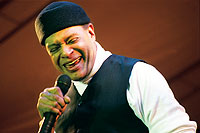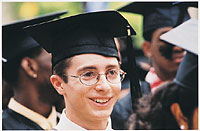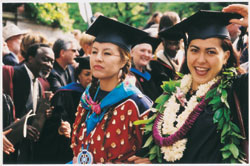It's known variously as the commencement march or commencement procession, but winding slowly, ever so slowly, down College Hill, what it is, really, is a big parade. Everyone's there. Throughout the weekend groups of people move around the lushly blooming campus in every direction and intersect only occasionally - at Campus Dance, perhaps, or at a particularly popular forum. On Saturday or Sunday you can see them moving across the Green in clusters of two or three or more, these beached relatives blinking at campus maps, or these exuberant sons and daughters negotiating the trick of spending a last few hours with dear friends without entirely abandoning the mothers and fathers, who, after all, made those friendships possible. (But, Mom, I'll catch up with you before lunch; don't worry, I'll find you!)

And then there are the name-tagged ones, alumni mostly, poking into buildings that either look so different or were not even standing all those years ago. (Can you believe so many years have passed?) They have registered, checked in, paid their class dues, written their reunion-gift checks, and donned their reunion hats. They push strollers in which kids in brand-new Brown t-shirts sit back, look around, drop sippy cups, get hungry, and demand to be picked up while at least one, and sometimes two, of their parents seem suddenly far too little interested in their every move. (Daddy, whowasthatIwant- somethingtoeatNOW!) On some of the plastic-sheathed name tags the difference between 2002 and the number displayed is perilously large; their owners are learning a corollary of the theory of relativity, i.e., that the rate of speed at which your notes move to the front of the BAM Classes section increases exponentially after, say, your twenty-fifth reunion. (They've got you on Lipitor, too, huh? Let me get my glasses. What else are you taking?)
No matter what surprises, disappointments, delights, adventures, or mini-catastrophes have unfolded on Friday, Saturday, or Sunday, on Monday morning everyone is up early and milling somewhere inside the Van Wickle Gates. Well, almost everyone. While seniors lying in the grass sleep off last night a little longer, and their teachers, donning a rainbow of caps and gowns, arrive out of nowhere; while class marshals strut about in top hats and tails and the events staff tries to keep things moving - while all this is going on inside the gates, parents, friends, and relatives scramble for position on the outside. The more nimble among them clamber up the walls outside the John Hay Library or, holding firmly onto cameras, risk a one-handed shinny up the bricks around the gates before uniformed security guards - especially attentive this year - ask them politely but firmly to climb back down.
The climbing and the shinnying are inventive responses to the primary Monday-morning concern among these out-on-the-street observers: camera position. After four years (or more) and all that money, what's more important than getting an image of that son or daughter coming through the gates? (You wanna see a picture I just took?) Yet the jostling for position is surprisingly considerate and polite, aided noticeably this year by a profusion of cell phones, each transmitting its own urgent signal. (You're where? Can you see anything? It's not that great here. Maybe I should come to you.) So many signals are rising skyward from such a concentrated space that it's a wonder they don't merge into a tractor beam tugging satellites to Earth and knocking planets momentarily from their orbits.

Wars are about territory and power, so it's no surprise that one consequence is a flood of people who are powerless and landless - refugees who survive in camps until the day comes when they can return to what's left of their homes. Finding a way to protect those refugees has been the work of Sadako Ogata, a former U.N. high commissioner for refugees, whose Stephen A. Ogden Jr. Memorial Lecture on Sunday argued that the only way to deal adequately with today's security threats is by addressing the needs of these refugees, who are themselves the victims of the cycle of terrorist violence and its aftermath. These, she noted, are the same refugees whose poverty and desperation, if neglected, make them recruiting targets for the Al Qaedas of the world.
Ogata said in passing that she'd watched the World Trade Center towers burn from the fortieth-story window of her Manhattan office. Brown lost four alumni in the towers, as well as two others that day: one in a Pennsylvania cornfield and one in the Pentagon. The loss of these six was noted throughout the weekend by Delta Tau, the fraternity whose members included four of the six dead. Delta Tau brothers planted a memorial tree on Saturday and marched on Monday morning carrying a memorial banner near the head of the line. Later, President Simmons eloquently recalled the dead to the Commencement crowd assembled on the Green: "In the midst of our joy," she said, "let us pause once again to acknowledge those members of the Brown family who lost their lives in the tragic events of September 11, and let us affirm this day that it is especially fitting that their lives be celebrated on this Memorial Day, when we celebrate the very spirit of human achievement." A few minutes later, in a seemingly spontaneous moment, honorary-degree recipient Jessye Norman asked for a microphone and launched, a cappella, into a stanza of "America the Beautiful."

And so it went on Commencement weekend during this troubling academic year, when the historic lurch of September 11 gave the artifacts and habits of tradition a sharper point than usual, a more urgent need to say This is who we are! This is what we believe! But make no mistake: Commencement on Monday morning is about joy and celebration. Every life has in it a string of such pearl-like defining moments, moments whose significance is obvious even as you experience them, and whose memory will continue to shape you for decades to come. So there's Henry Is} '22 at the head of the line, here at age 101 for his eightieth reunion and now making his way through the Gates with a little help from his friends. Behind him is former BAM editor Chet Worthington '23, marching in his eightieth consecutive Commencement, and way back there come the seniors, tipping their mortarboards as they pass through the gates, spraying themselves and the admirers around them with a fountain of champagne. The sticky-sweet smell is still there a half-hour later, long after the graduates have moved on.
Baccalaureate
Good Counsel
Advising the seniors at the Baccalaureate ceremony at the First Baptist Church, Supreme Court Associate Justice Ruth Bader Ginsburg cited a wedding-day tip from her mother-in-law: "In every good marriage . . . it helps, sometimes, to be a little hard of hearing." Ginsburg said she has followed that counsel, "with only occasional lapses - not only at home . . . but even now, in relations to my colleagues at the Supreme Court." Listening is important, she said, but it pays to tune out "when angry, unkind, or thoughtless words are spoken."
Memorial
Finding a Cause
The Delta Tau party might have been any other pre-campus-dance bash with loud music, strong drinks, and lots of nostalgia. But this year's party was bittersweet. It kicked off a weekend of events in memory of the six alumni who died on September 11. Four of them were Delts.
Under a banner that read "Remember the Boys," the festivities got underway at 6 p.m. on the porch of South Wayland, the former Delt house. Nursing a batch of orange blossoms, a vodka concoction served from a garbage pail and stirred with a hockey stick, members talked about kids and careers and reminisced about their wild days on campus - the year they lost the frat house, for example, or the party so out of control that mothers who learned of it wouldn't let their sons pledge. "It's a miracle they even let us have this party," laughed one Delt alum.
As the orange blossoms flowed, the Delts agreed the camaraderie was a fitting tribute to their fallen brothers. The next morning the mood was more somber as the Delts returned to the South Wayland porch to plant a memorial tree. Led by a bagpiper, they marched just off Wriston Quad to Patriots Court, which was dedicated in 1952 to alumni lost in service to their country. Once there, the Delts honored their four brothers lost on September 11 - Charles Margiotta '79, David Laychak '83, Raymond Rocha '95, and Paul Sloan '97 - and the other alumni victims - Donald Greene '71 and Joanne Weil '84. The ceremony was also a tribute to six Delts who've died from other causes in past years.
The memorial was the work of Delt undergraduates, led by president Richard Sutherland '02, and the Delt Foundation, which was founded specifically to raise money for the weekend's events. "We were a fraternity on campus that was never known for having a cause, other than self-serving parties," says Russell Settipane '80, chair of the foundation. "We just had this compelling sense that we had to remember our brothers."
The remembrance continued on Monday morning, when Delts carried a banner near the head of the Commencement march bearing the names of the six alumni lost on September 11. - Emily Gold Boutilier
The Graduate School
In Pursuit of Sancho Panza
Nearly a century after the 1903 formation of the graduate department - the forerunner to the Graduate School - Brown awarded 150 Ph.D.s and close to 300 master's degrees at this year's Commencement.
"It's not just the numbers [of students] that have gone up, it's the level of scholarship," said Dean of the Graduate School Peder Estrup, who was presiding over his sixth and final Commencement. (He will be returning to the faculty this fall.)
Giving the student address minutes before receiving his Ph.D. in Hispanic studies, William Worden compared the journey through graduate school to the transition from reader to author. Using Miguel de Cervantes's classic antiheroes Don Quixote and Sancho Panza as examples, Worden said graduate students start out like Don Quixote, accepting the work of authorities, but often end up more like Sancho Panza, questioning the establishment. Worden celebrated this transition from student to teacher, in which young scholars begin to trust their own ideas over those of entrenched academics.
"Perhaps some day some Brown graduate student will come across something we have written," he said. "They may even choose to quote our work in a footnote. I hope they disagree with us." - Zachary Block '99
The Medical School
Measuring America's Success
"We do not have a money problem. We have a values and priorities problem," Marian Wright Edelman, founder and president of the Children's Defense Fund, told graduating M.D.s at the Medical School Commencement exercises. "An American child is reported abused or neglected every eleven seconds," she said. One in five lives in poverty "during the first three years of life, the time of greatest brain development." Once a minute, an American child is born without health insurance, and 90 percent of the nine million uninsured children have parents who work. Gunfire, she said, kills nine children a day: "It is safer to be an on-duty law enforcement officer than a child under ten in America." Edelman challenged the Bush administration's proposal to accelerate its 2001 tax cut schedule and urged her audience to "vote for the children who cannot vote for themselves." - Charlotte Bruce Harvey '78





